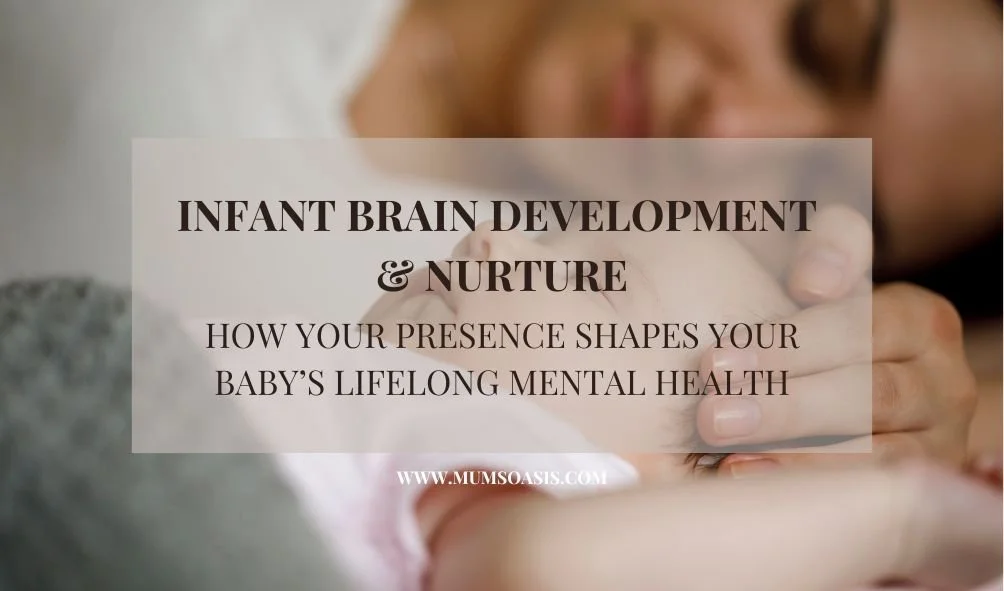Infant Brain Development & Nurture: Why Your Presence Shapes Your Baby’s Lifelong Mental Health
If you’re a parent (especially a mum in the thick of those early days) you’ve probably been told more than once that “your baby just needs you.” And while that can feel both comforting and overwhelming, it’s also deeply true.
What you offer your baby in these first months and years isn’t just love and comfort in the moment. You are helping to build the very foundation of their mental health, their stress resilience, their relationships and even their future sense of self.
Let’s explore how powerful nurture really is and why the simple, everyday ways you show up matter more than anything else.
Your Love Is Building Your Baby’s Stress System
From the moment your baby arrives, their nervous system is still incredibly immature. In fact, human infants are born with only about 25% of their adult brain volume. Their brain will form over one million new neural connections every second in the first years of life.
Because a baby’s stress system is underdeveloped, they rely on caregivers as their “external brain.”
Your calming touch, your warm voice, your responsiveness…these regulate their tiny nervous system when it can’t do it alone. Over time, these repeated moments build a resilient stress response that protects them for life.
This resilience becomes the foundation for lower anxiety, a stronger capacity for emotional regulation and a reduced risk of long-term mental health struggles like depression.
In other words: every time you soothe, rock, feed, respond, cuddle or simply be there, you’re shaping not just a moment but your baby’s brain and with that their lifelong ability to cope with stress.
Nurture Shapes the Growing Brain
Because of the brain’s incredible plasticity, nurture during infancy has an especially powerful impact. It influences:
The limbic system, which handles emotions
The prefrontal cortex, which guides problem-solving, learning, memory, and emotional regulation
Stress-regulation structures like the amygdala and hippocampus
Research shows that babies who receive consistent, responsive care have better emotional health decades later. One study found that adults whose mothers were highly nurturing when they were babies had significantly lower anxiety 30 years on (Maselko et al., 2011).
MRI studies also show that sensitive, attuned caregiving in infancy is associated with healthier, more robust brain development in early childhood (Kok et al., 2015).
This is not about “perfect parenting.” This is about presence, responsiveness, and relationship. Being a safe place where your baby’s brain can grow in peace.
The Heart of Nurture: What Babies Need Most
While every family’s style looks different, researchers consistently highlight a few core elements of nurture that help babies thrive:
1. Sensitivity
Being responsive to your baby’s cues such as feeding when they’re hungry, comforting when they’re upset, and giving closeness when they seek it, builds secure attachment. This secure base becomes the blueprint for future relationships.
2. Attunement
This is the “dance” between you and your baby. The eye contact, the coos, the matching of emotions. Attunement tells your baby, “I see you. You matter.”
3. Co-regulation
Before babies can calm themselves, they rely on you to help them manage emotions. Your calm becomes their calm. Your presence becomes their anchor. This is what slowly blossoms into self-regulation later in life.
These moments don’t need to be perfect, constant or uninterrupted. They just need to be good enough and repeated over time.
Nurture as a Radical Act
In many Western cultures, parents are encouraged to prize independence early: long stretches of crying, early self-soothing, separation as a “skill.” But biologically, babies aren’t wired for independence. They’re wired for connection.
Being a soft, steady presence in a world that pushes independence is not spoiling.
It’s biology.
It’s ancestral wisdom.
It’s the foundation of resilience.
As neuroscientist Dr Greer Kirshenbaum says, nurturing is a radical act in a culture that values self-reliance from day one.
Nurture Doesn’t Just Shape One Child, It Shapes Generations
Here’s something extraordinary: nurture doesn’t stop with your baby.
Through epigenetic processes (changes in the way genes are expressed) your warmth and responsiveness can influence not just your child’s development, but potentially the health and resilience of future generations.
This means that when you nurture your baby, you may be breaking old cycles and laying down new pathways of wellness for your entire family line.
You are quite literally changing the future.
When Temperament Meets Nurture
Some babies come into the world more sensitive, more reactive or with bigger emotions. But research shows that nurturing caregiving can buffer even the most challenging temperaments.
Studies have found that:
Infants with strong negative emotionality only show higher long-term stress hormones when early parental nurture is low.
Children with lower self-regulation show higher markers of immune stress only if early parent-infant synchrony was low (Abraham et al., 2021).
Meaning: your presence and connection can soften the impact of a child’s innate sensitivities.
You don’t need to change who your baby is, you just need to meet them where they are.
You Are Exactly What Your Baby Needs
If you ever worry that you’re not doing enough, remember this:
Your baby’s greatest need is you.
Not a perfect version of you.
Just you responding, noticing, holding, trying again.
Every cuddle, every whispered “it’s okay,” every moment of attunement builds the architecture of your child’s brain and the roots of their mental health.
You are creating safety.
You are creating connection.
You are creating resilience, one everyday moment at a time.
And that is the most important work in the world.
🌿 Nurtured Sleep Consultations
If you want sleep support for your baby is based on their biology and tailored to your baby’s unique sleep needs, I offer 1:1 virtual sleep consults where we create a plan specifically for your family.
[Click here to learn more and book a session →]
As a Nurtured Neuroscience Practitioner, my approach is rooted in nurture and neuroscience to optimise infant and family sleep.
Resources:
Nurture Neuroscience, Dr Greer Kischenbaum and Dr Rocio Zunnini
Kirshenbaum, G. (2023). The Nurture Revolution. Hachette Book Group.
Related Blog Posts
The Power of Affectionate Touch: How Physical Contact Shapes Infant Development



